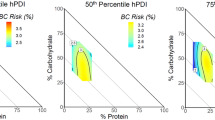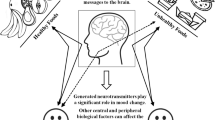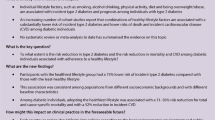Abstract
Objectives
To investigate the association of dietary patterns with a 3-year incidence of depression among healthy older adults.
Design
Multiple logistic regression models adjusted for age, sex, marital status, smoking, education, total energy intake, physical activity, body mass index, hypertension, functional autonomy, cognitive functioning, social activities, and stressful life events. Energy and macronutrient intakes were also analyzed as potential predictors of depression.
Setting
Cities of Montréal, Laval, and Sherbrooke in Quebec, CA.
Participants
Community-dwelling older adults, free of depression at baseline (N=1,358, 67–84 y), followed for 3y in the Québec Longitudinal Study on Nutrition and Aging (NuAge).
Measurements
Dietary patterns derived from principal components analysis of three 24 h-recalls at baseline, and depression incidence as measured by the 30-item Geriatric Depression Scale (≥11) and/or use of antidepressants at follow-up years.
Results
170 people (63% women) became depressed over the 3 years. People in the highest tertile of adherence to the “varied diet” had lower risk of depression before adjustment (OR 0.58, 98% C.I. 0.38–0.86) but not significant once age and sex were controlled. No other dietary pattern was associated with the incidence of depression. The highest tertile of energy intake was associated with lower depression incidence after controlling for all confounders (OR 0.55, 95%CI 0.34–0.87).
Conclusion
Among healthy older adults, dietary patterns do not appear to be related to depression. Those who eat less, however, possibly reflecting declining health, are at higher risk of becoming depressed.
Similar content being viewed by others
References
Stanner S, Thompson R, Buttriss J, British Nutrition Foundation (ed). Healthy ageing: The role of nutrition and lifestyle. The report of a British Nutrition Foundation task force. London: Wiley-Blackwell, 2009.
Blazer DG. Depression in late life: Review and commentary. J Gerontol A Biol Sci Med Sci. 2003;58(3):249–65.
Murray CJ, Lopez AD. Evidence-based health policy—lessons from the Global Burden of Disease Study. Science. 1996;274(5288):740–3.
Hamer M, Bates CJ, Mishra GD. Depression, physical function, and risk of mortality: National diet and nutrition survey in adults older than 65 years. Am J Geriatr Psychiatry. 2011;19(1):72–8.
Galimanis A, Mono ML, Arnold M, Nedeltchev K, Mattle HP. Lifestyle and stroke risk: A review. Curr Opin Neurol. 22(1):60–8.
Mezuk B, Eaton WW, Golden SH. Depression and osteoporosis: Epidemiology and potential mediating pathways. Osteoporos Int. 2008;19(1):1–12.
Donini LM, Savina C, Cannella C. Eating habits and appetite control in the elderly: The anorexia of aging. Int Psychogeriatr. 2003;15(1):73–87.
Palsson S, Skoog I. The epidemiology of affective disorders in the elderly: A review. Int Clin Psychopharmacol. 1997;12(7):S3–13.
Penninx BW, Leveille S, Ferrucci L, van Eijk JT, Guralnik JM. Exploring the effect of depression on physical disability: Longitudinal evidence from the established populations for epidemiologic studies of the elderly. Am J Public Health. 1999;89(9):1346–52.
Cassidy K, Kotynia-English R, Acres J, Flicker L, Lautenschlager NT, Almeida OP. Association between lifestyle factors and mental health measures among community-dwelling older women. Aust N Z J Psychiatry. 2004;38(11–12):940–7.
Bodnar LM, Wisner KL. Nutrition and depression: Implications for improving mental health among childbearing-aged women. Biol Psychiatry. 2005;58(9):679–85.
Kohatsu W. Nutrition and depression. Explore (NY). 2005;1(6):474–6.
Blake H, Mo P, Malik S, Thomas S. How effective are physical activity interventions for alleviating depressive symptoms in older people? A systematic review. Clin Rehabil. 2009;23(10):873–87.
Bridle C, Spanjers K, Patel S, Atherton NM, Lamb SE. Effect of exercise on depression severity in older people: Systematic review and meta-analysis of randomised controlled trials. Br J Psychiatry. 2012;201:180–5.
Murakami K, Sasaki S. Dietary intake and depressive symptoms: A systematic review of observational studies. Mol Nutr Food Res. 2010;54(4):471–88.
Hu FB. Dietary pattern analysis: A new direction in nutritional epidemiology. Curr Opin Lipidol. 2002;13(1):3–9.
Akbaraly TN, Brunner EJ, Ferrie JE, Marmot MG, Kivimaki M, Singh-Manoux A. Dietary pattern and depressive symptoms in middle age. Br J Psychiatry. 2009;195(5):408–13.
Le Port A, Gueguen A, Kesse-Guyot E, Melchior M, Lemogne C, Nabi H, et al. Association between dietary patterns and depressive symptoms over time: A 10-year follow-up study of the GAZEL Cohort. PLoS One. 2012;7(12):e51593.
Rienks J, Dobson AJ, Mishra GD. Mediterranean dietary pattern and prevalence and incidence of depressive symptoms in mid-aged women: Results from a large community-based prospective study. Eur J Clin Nutr. 2013;67(1):75–82.
Jacka FN, Mykletun A, Berk M, Bjelland I, Tell GS. The association between habitual diet quality and the common mental disorders in community-dwelling adults: The Hordaland Health Study. Psychosom Med. 2011;73(6):483–90.
Samieri C, Jutand M-A, Feart C, Capuron L, Letenneur L, Barberger-Gateau P. Dietary patterns derived by hybrid clustering method in older people: Association with cognition, mood, and self-rated health. J Am Diet Assoc. 2008;108(9):1461–71.
Gaudreau P, Morais JA, Shatenstein B, Gray-Donald K, Khalil A, Dionne I, et al. Nutrition as a determinant of successful aging: description of the Quebec longitudinal study Nuage and results from cross-sectional pilot studies. Rejuvenation Res. 2007;10(3):377–86.
Health Canada. Canadian nutrient file, version 2007b. http://www.hc-sc.gc.ca/fn-an/nutrition/fiche-nutri-data/index_e.html. Accessed cited 2007;18 Feb 2008.
Payette H, Gray-Donald K. Dietary intake and biochemical indices of nutritional status in an elderly population, with estimates of the precision of the 7-d food record. Am J Clin Nutr. 1991;54(3):478–88.
Brink TL, Yesavage JA, Lum O, Heersema PH, Adey M, Rose TL. Screening tests for geriatric depression. Clinical Gerontol. 1982;1(1):37–43.
Washburn RA, McAuley E, Katula J, Mihalko SL, Boileau RA. The Physical Activity Scale for the Elderly (PASE): Evidence for validity. J Clin Epidemiol. 1999;52(7):643–51.
Desrosiers J, Bravo G, Hébert R, Dubuc N. Reliability of the revised Functional Autonomy Measurement System (SMAF) for epidemiological research. Age Ageing. 1995;24(5):402–6.
Teng EL, Chui HC. The Modified Mini-Mental State (3MS) examination. J Clin Psychiatry. 1987;48(8):314–8.
Payette H, Guigoz Y, Vellas BJ. Study design for nutritional assessments in the elderly. In: Yu BP (ed). Methods in aging research. Boca Raton: CRC Press LLC. p. 1999;301–20.
Lefrançois R, Leclerc G, Dubé M, Hamel S, Gaulin P. Valued activities of everyday life among the very old—a one-year trend. Act Adapt Aging. 2001;25(3):19–34.
Chocano-Bedoya PO, O’Reilly EJ, Lucas M, Mirzaei F, Okereke OI, Fung TT, et al. Prospective study on long-term dietary patterns and incident depression in middle-aged and older women. Am J Clin Nutr. 2013;98(3):813–20.
Hodge A, Almeida OP, English DR, Giles GG, Flicker L. Patterns of dietary intake and psychological distress in older Australians: benefits not just from a Mediterranean diet. Int Psychogeriatr. 2013;25(03):456–66.
Alexopoulos GS. Depression in the elderly. Lancet. 2005;365(9475):1961–70.
Skarupski K, Tangney CC, Li H, Evans DA, Morris MC. Mediterranean diet and depressive symptoms among older adults over time. J Nutr Health Aging. 2013;17(5):441–5.
Hussin NM, Shahar S, Teng NI, Ngah WZ, Das SK. Efficacy of fasting and calorie restriction (FCR) on mood and depression among ageing men. J Nutr Health Aging. 2013;17(8):674–80.
Anderson JJ, Suchindran CM, Kritchevsky SB, Barrett-Connor E. Macronutrient intakes of elderly in the Lipid Research Clinics Program Prevalence Study. J Nutr Health Aging. 2004;8(5):395–9.
de Castro JM, Stroebele N. Food intake in the real world: implications for nutrition and aging. Clin Geriatr Med. 2002;18(4):685–97.
Fox KR. The influence of physical activity on mental well-being. Public Health Nutr. 1999;2(3A):411–8.
Schuit AJ. Physical activity, body composition and healthy ageing. Sci Sports. 2006;21(4):209–13.
Djernes JK. Prevalence and predictors of depression in populations of elderly: A review. Acta Psychiatr Scand. 2006;113(5):372–87.
Østbye T, Kristjansson B, Hill G, Newman SC, Brouwer RN, McDowell I. Prevalence and predictors of depression in elderly Canadians: The Canadian Study of Health and Aging. Chronic Dis Can. 2005;26(4):93–9.
Hickson M. Malnutrition and ageing. Postgrad Med J. 2006;82(963):2–8.
Author information
Authors and Affiliations
Corresponding author
Electronic supplementary material
Rights and permissions
About this article
Cite this article
Gougeon, L., Payette, H., Morais, J. et al. Dietary patterns and incidence of depression in a cohort of community-dwelling older Canadians. J Nutr Health Aging 19, 431–436 (2015). https://doi.org/10.1007/s12603-014-0562-9
Received:
Accepted:
Published:
Issue Date:
DOI: https://doi.org/10.1007/s12603-014-0562-9




